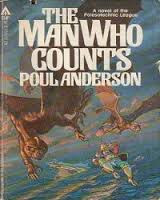Space travel in science fiction has two contradictory aspects. It is an exciting adventure but also becomes a routine matter in a complicated technological society where attention is instead focused on more mundane issues like survival and earning a living.
Thus, Poul Anderson's Eric Wace grows up in a slum near the regular earthquake noise of a spaceport but gets into space leaving the slum behind. Jerry Pournelle's John Christian Falkenberg is in a queue of involuntary colonists at a spaceport at the beginning of The Mercenary.
In the opening paragraph, unpleasant smells and incessant noise assault Falkenberg. In the next, he sees dingy white walls and bright sunshine. Thus, we note a well controlled third person point of view narration and direct appeals to three of the senses. We are in familiar Heinleinian-Andersonian territory and want to accompany this new viewpoint character out of the solar system.

3 comments:
Kaor, Paul!
Your first paragraph puzzles me. Why should it be contradictory for space travel to be exciting but also a routine matter in a complex technological society? I would argue that for PIONEERS of space travel it will be plenty exciting! And even centuries later space travel will remain adventurous for those pushing out into the complete unknown past the frontiers of a space traveling civilization.
True, most people won't be space travelers. Most will be content to live out their lives on whichever planet they live on.
Sean
Sean,
Perhaps I should have written "opposite"?
Paul.
Kaor, Paul!
Hmmm, "Space travel in science fiction has two OPPOSITE aspects"? Yes, that's better than "contradictory."
Sean
Post a Comment